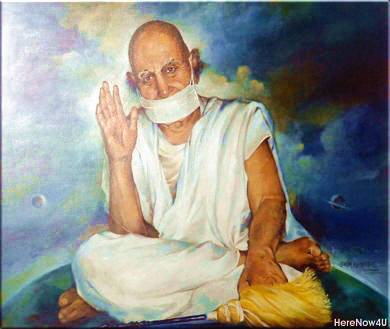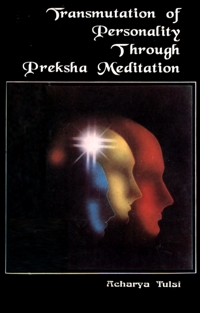
In your last talk you said that preksha dhyana is the next stage of anuvrat. It means that a preksha meditator must of necessity be an anuvrati. Is it possible to practise preksha dhyana without first observing the rules of anuvrat?
A person who practises meditation in the preksha dhyana shivirs [Preksha Meditation Camp], is required to take certain pledges. In order to assimilate what is offered at these camps, it is absolutely necessary for a preksha meditator to have the qualification of an anuvrati. One who wishes to practise meditation regularly after the shivir, must also observe the anuvrat code of conduct. As preksha meditation matures, the observance of the anuvrat code will become more and more natural. As long as life is not pure and clean, one takes definite pledges to observe anuvrats. After the necessary purification, however, one does not have to take a pledge, anuvrat now becomes a part of one's being. The flowers of preksha blossoming in a life purified by anuvrata are remarkably beautiful. In keeping those flowers fresh and blooming forever, the indispensability of anuvrat in the background of preksha cannot be denied.
Just as the observance of anuvrat is necessary for the practice of preksha meditation, is not preksha dhyana a requisite for the realisation of anuvrat in one's life?
Since anuvrat and preksha have been recognised as being complementary to each other, how can an anuvrati make any progress towards his goal without practising preksha dhyana? This question relates, not only to the present time, but to the beginning of the anuvrat era. At that time, many intelligent people asked, "We may accept the anuvrat pledges, but how do we realize them? How to fulfil them?" The raising of such questions with regard to the taking of pledges is not unnatural either, because sadhana is required to fulfil every pledge. Such sadhana may bear fruit in a short time or one may have to wait for a long time for success. However that may be, the necessity of deep commitment and continuity of practice cannot be ignored. Constant practice matures early. From this point of view, in order to make anuvrat a natural part of one's life, the practice of preksha dhyana is very necessary. Sometime ago, Shri Ratan Lal Joshi, the former Editor of Hindusthan, went to America and talked about anuvrat there. Many Americans who found it interesting, said, "The anuvrat code of conduct is quite good, very useful, but how about its practice?" In this context, it becomes very clear that the practice is the chief factor in any talk of sadhana. In the absence of practice, no sadhana can really mature. We must never forget that practice is essential for the fulfilment of a pledge.
A total view of the undertaking of fasts or pledges, their observance and their consummation reveals a great lack of understanding in the public mind as regards the whole procedure. This is because a man, the moment he undertakes a fast, wants to see its good results at once. As a matter of fact, the fast by itself brings about, no transformation; it is not a magic spell which shows item effect the moment one utters it. A man who takes a pledge, but makes no effort to fulfil it, does no sadhana whatever. How will such a man ever taste its fruit? It is as if a sick man should take the medicine but not the prescribed diet! How can his treatment be effective? The medicine has the virtue of driving away the illness, but without the prescribed diet, this virtue is rendered ineffective, and with the intake of unwholesome food, it even turns destructive. With the result that the medicine, instead of restoring one's health, might further aggravate it. Likewise, in order to derive benefit from a resolution, one must practise it.
A man takes a vow that he would never utter an untruth. It is all very good, but unless he removes all the causes that make him tell lies, how will his vow be ever fulfilled? The chief factors behind the telling of an untruth are: anger, greed, fear, and fun. Unless one attains freedom from these, the possibility of uttering falsehoods cannot be obviated. A man takes a pledge never to indulge in anger. But if all those tendencies which provoke wrathful passion are present in him in strength, how will he abide by his pledge? The same is true of other vows and pledges: It is a poor intelligence which expects immediate results following the taking of a pledge, or loses all faith if no such results are forthcoming.
In my opinion, a pledge or a vow is merely the determination of a direction one wishes to take. This gives an individual a sense of what is to be done and what is to be avoided. This discrimination forms the initiative of an awakened consciousness. But this alone is not sufficient for the fulfillment of the pledge. The mere acceptance of a pledge does not, cannot, end the fickleness of the mind. For the maturing of the vow requires the fire of practice. If someone wants to cook food, boil the milk, or make something out of gold metal, he will have to heat these materials on fire. Without the required heat, adequate results would not be forthcoming. The practice of meditation is also like a fire. It is on this fire that a man's mind matures. In a ripe mind alone does resolution mature, and it is through mature resolution that transformation takes place in life. Therefore, anuvrat and preksha meditation cannot be separated. Preksha is necessary for anuvrat and anuvrat for preksha. Both are mutually made for each other. To undo this connection is not in the interest of anyone.
Anuvrat has a moral code of its own, which has been determined on the basis of evils prevailing in all classes. Similiarly, has preksha dhyana, too, an independent code? What is its basis?
If preksha needs a code of conduct, it is anuvrat itself. Because preksha is a practical technique, it can only be acquired through practice. From this viewpoint its practice is the realisation of every doctrine. One of the pledges of anuvrat is - "I shall not consider any person untouchable." For the realization of this pledge, a preksha sadhak will banish from his mind all feeling of hatred. In order to completely end all malice, the feeling of hatred subsisting in the inmost recesses of the mind will have to be annihilated. Without such purging the pledge will not be fulfilled. The purging is done through meditation. It is through meditation that the heterogeneous elements accumulated in the mind are rooted out, its fickleness ended, meritorious deeds evoked, concentration and abiding faith enhanced. As long as a man does not achieve integration, cannot concentrate his mind upon one object, cannot control the mind's restlessness, he will not be able to develop pure observation.
The whole point of the foregoing discussion is that preksha in itself is the fruition of a moral code. Thus, no independent code of conduct has been prescribed for it. Of course, while practising preksha dhyana, one is required to be initiated. Initiation and its rules we shall discuss later. It is enough to say here that if preksha dhyana has a code of conduct, it is:
Maintaining the purity of the heart and the mind's concentration.
Only those sadhaks who succeed in creating this condition, can attain the higher stages of meditation.
 Acharya Tulsi
Acharya Tulsi
